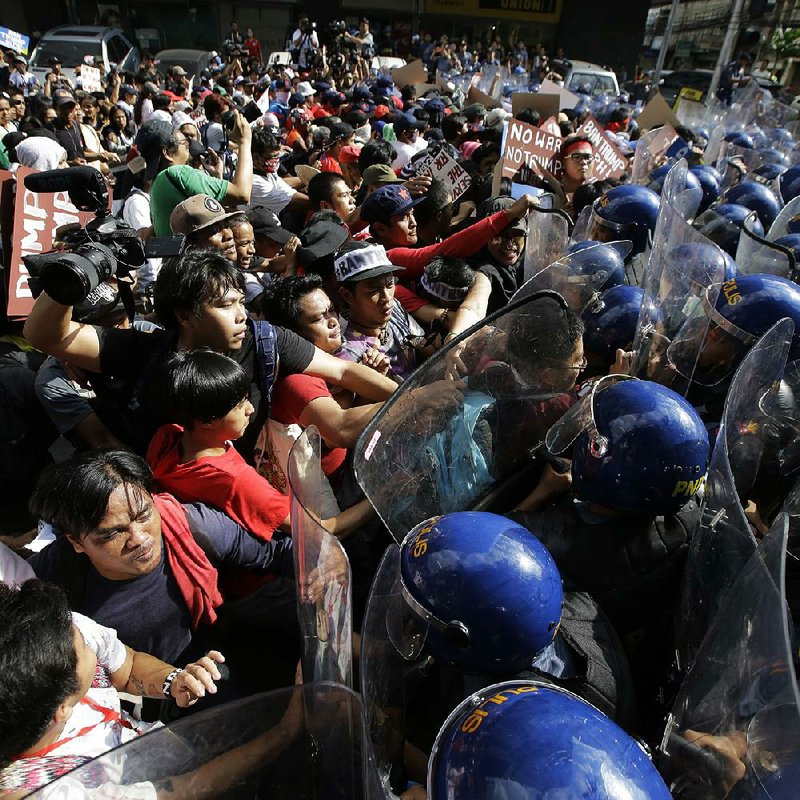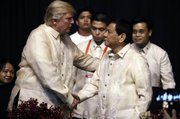MANILA, Philippines -- President Donald Trump on Sunday offered to mediate in the South China Sea disputes, while his Chinese counterpart played down concerns over Beijing's military buildup and the prospects of war in the contested waters.
Trump and Chinese President Xi Jinping spoke separately about the territorial rifts ahead of an annual summit of Southeast Asian nations that includes the U.S., China and other global players. The disputes are expected to get the spotlight at the summit, along with the North Korean nuclear threat and terrorism.
The long-simmering disputes are one issue where the two major powers' influence, focus and military might have been gauged, with the U.S. and China both calling for a peaceful resolution but taking contrasting positions in most other aspects of the conflict.
Unlike China, the U.S. is not a claimant to the potentially oil-rich and busy waters, but it has declared that it has a national interest in ensuring freedom of navigation and overflight and the peaceful resolution of the disputes. Several nations back an active American military presence in the region to serve as a counterweight to China's increasingly assertive actions, including the construction of seven man-made islands equipped with military installations.
[PRESIDENT TRUMP: Timeline, appointments, executive orders + guide to actions in first 200 days]
"I'm a very good mediator and arbitrator," Trump said at a news conference with Vietnamese President Tran Dai Quang in Vietnam's capital, Hanoi, before flying to Manila for the summit of the Association of Southeast Asian Nations.
Trump's offer faces major obstacles. For one, China has steadfastly opposed what it calls U.S. meddling in the disputes and has balked at the U.S. Navy's incursions into what Beijing considers its territorial waters in the South China Sea.
While the U.S. doesn't take a position on territorial disputes, it has criticized China for land reclamation and other moves to assert control over areas also claimed in part by Vietnam, the Philippines and other countries. Quang didn't answer directly when asked later about Trump's offer to mediate.
"I have shared my thoughts with President Donald Trump on the recent developments in this area," he said.
"It's our policy to settle disputes in the East Sea through peaceful negotiations and with respect for diplomatic and legal process in accordance with international law, including the U.N. Convention on the Law of the Sea," he said, referring to the South China Sea.
The Philippines welcomed Trump's offer, though officials said that any effort would need to be coordinated among other countries in the region.
Trump's offer "is a very kind and generous offer because he is a good mediator," Philippine Foreign Secretary Alan Peter Cayetano told reporters in Manila.
"He is the master of the art of the deal but, of course, the claimant countries have to answer as a group or individually ... mediation involves all the claimants and nonclaimants," Cayetano said.
Philippine President Rodrigo Duterte said Xi, during a meeting in Danang, Vietnam, where they attended the annual Asia-Pacific Economic Cooperation forum last week, assured him of China's peaceful intentions in the strategic waterway, where Beijing, the Philippines, Vietnam and three other governments have overlapping claims.
When he raised concerns over China's increasing military capability in the South China Sea, Duterte said Xi replied, "No, it's nothing."
"He acknowledged that war cannot be promoted by anybody, [that] it would only mean destruction for all of us," Duterte told reporters after flying back to Manila. "He knows that if he goes to war, everything will blow up."
Duterte said Xi told him that he didn't want to "waste the lives of my countrymen for a useless war that cannot be won by anyone."
Relations between China and the Philippines have opened a new chapter after Duterte's visit in October, China's official Xinhua News Agency quoted Xi as saying after the meeting.
The Chinese leader, however, would not back down on Beijing's territorial claim, Duterte said and justified his decision not to immediately demand Chinese compliance with a ruling by a U.N.-linked tribunal that invalidated China's sweeping claims in the South China Sea on historical grounds.
China has dismissed that ruling as a "sham" and did not participate in the arbitration case that the Philippines filed during the administration of Duterte's predecessor.
"If you go to the negotiating table and you start with the statement that I am here to claim validity of our ownership, you're wasting your time. They will not talk about it," Duterte said of China.
Since his election, Duterte has backed down from contentious territorial disputes with Beijing -- last week, he halted a construction project in the South China Sea that brought Chinese complaints -- despite an international ruling early in his presidency that backed the Philippines.
Harry Roque, a spokesman for Duterte, described his policy as a deliberate turn toward closer relationships with countries in Asia, and with China in particular.
Duterte hopes his strategy will bring billions of dollars in investment from China, although the money has been slow in coming, said Richard Javad Heydarian, an assistant professor of political science at De La Salle University in Manila.
Vietnam has become the most vocal opponent of China's moves after Duterte softened his country's stance on China.
Tran Viet Thai of the Vietnam Diplomatic Academy said Xi's visit is important to build mutual trust.
"The visit marks a new step forward in Vietnam-China relations," he said. "Hopefully the relations will continue to stabilize, because the two sides currently share great interests in broadening their cooperation and maintaining stability."
Meanwhile, Hong Kong signed a free-trade agreement and an investment deal Sunday with the Association of Southeast Asian Nations in pacts that it said are a vote against protectionism elsewhere.
Officials said the free-trade agreement they signed with Hong Kong in Manila is the sixth such deal forged by the 10-nation bloc after concluding similar pacts with China, Japan, South Korea, India, Australia and New Zealand.
Hong Kong Commerce Secretary Edward Yau Tang-wah said the new free-trade accord is "a loud and clear vote from all of us here for freer and more open trade" amid protectionist tendencies in other parts of the world.
Philippine Trade Secretary Ramon Lopez, this year's chairman of the association's Economic Ministers, said the signing of the two agreements marks the commitment toward shared prosperity and inclusive growth in the region.
"We send a strong message to the world of our outward oriented drive and economic resolve toward cooperation," he said.
The Association of Southeast Asian Nations summit opens today under extra-tight security at a theater and convention complex by Manila Bay. Duterte hosted a gala dinner Sunday for leaders including Trump, Russian Prime Minister Dmitry Medvedev, Chinese Premier Li Keqiang and Japanese Prime Minister Shinzo Abe, who all wore traditional barong shirts.
Riot police used shields and water hoses Sunday to push back hundreds of left-wing activists who tried to hold a protest at the U.S. Embassy in Manila and carried placards that read "Ban Trump." At least 20 protesters were injured in the brief scuffle and one was arrested, according to protest leaders, adding that the demonstrators dispersed after burning a mock U.S. flag.
Information for this article was contributed by Jim Gomez, Teresa Cerojano and other staff members of The Associated Press; Jennifer Jacobs, Andreo Calonzo, Keith Zhai Clarissa Batino and Cecilia Yap of Bloomberg News; and by Richard C. Paddock and Felipe Villamor of The New York Times.
A Section on 11/13/2017

